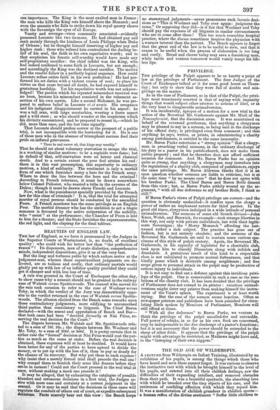BEAUTIES OF ENGLISH LAW. • THE law of England, as
we have it pronounced by the Judges in the Superior Courts at Westminster, is, no doubt, of excellent quality : who could wish for better law than "the perfection of reason ' ? Its dispensers, men of acute dialectics, comprehensive minds, independent dispositions, give it us of the very best. But the long and tortuous paths by which suitors arrive at the judgment-seat, whence those superexcellent judgments are de- livered, are so tedious and costly, that ordinary mortals would gladly put up with law of an inferior quality provided they could get it cheaper and with less loss of time.
A rule was granted in the Court of Exchequer the other day, to show cause why a nonsuit should not be granted in the railway case of Walstab versus Spottiswoode. The counsel who moved for the rule took occasion to refer to the case of Woolmer versus Toby, in which the verdict of the Jury was diametrically oppo- site to the verdict returned in the case of Walstab versus Spottis- woode. The allusion elicited from the Bench some remarks upon these contradictory judgments, more edifying to unconcerned third parties than consolatory to litigants. The Chief Baron declared—with the assent and approbation of Bench and Bar— that both cases had been "decided formally at Nisi Prius, re- serving the real decision for the Court."
The dispute between Mr. Walstab and Mr. Spottiswoode rela- ted to a sum of 78/. 1(3s. • the dispute between Mr. Woohner and Mr. Toby, to a sum of 200/. or 3001. It is pretty certain that in either case the "formal" decision at Nisi Prins would cost the par- ties as much as the sums at stake. Before the real decision is obtained, these expenses will at least be doubled. It would have been better for any of the parties to have agreed to divide the money, or to put up with the loss of it, than to pay so dearly for the chance of its recovery. But why put them to such expense ? why insist that a merely formal trial shall precede the real one ? why compel them to flourish their arms like fencers before they set-to in earnest ? Could not the Court proceed to the real trial at once, without making a mock one precede it ?
It may be alleged, that by exhausting the catalogue of possible blunders and erroneous decisions in a first trial, the Judges ar- rive with more ease and certainty at a correct j . udgment in the second. Or it may be said that the decisions in these cases will regulate the conduct of others out of court, or expedite subsequent decisions. Facts scarcely bear out this view : the Bench keeps
no stereotyped judgments—never pronounces such laconic deci- sions as "This is Woolmer and Toby over again: judgment the same." Or supposing they did—is it fair that Woolmer and Toby should pay the expenses of all litigants in similar circumstances who are to come after them? This too much resembles hospital practice, where the disease sometimes inspires the physician with a warmer interest than the patient. The Bench appears to forget that the great end of the law is to be useful to men, and that it ceases to be useful when the process of elaboration is too long and costly. Bread and cheese today may save a famishing man, while turtle and venison tomorrow would vainly tempt his life- less lips.


























 Previous page
Previous page